Yearly Archives: 2013
In Memoriam: Sgt. Michael J. McGann
Tuesday, November 5th, 2013
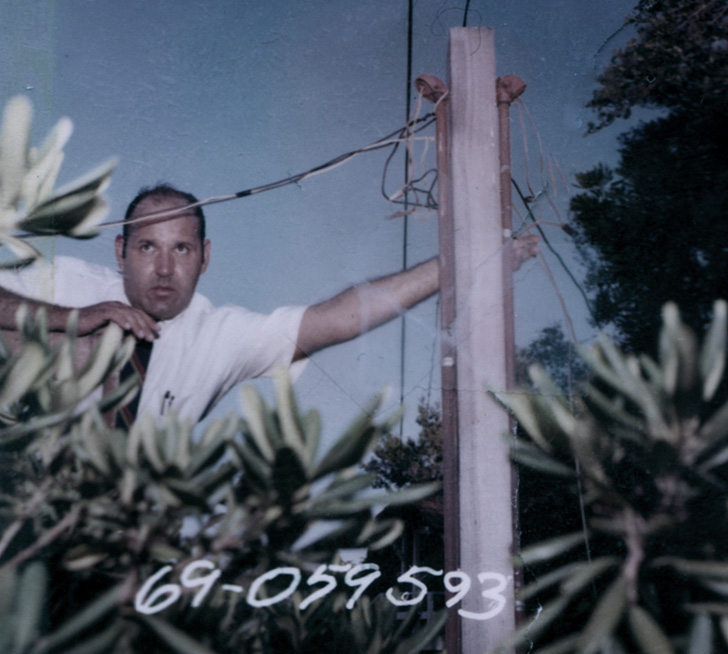
Nov. 5 – We have been informed by the Los Angeles Police Department that retired LAPD detective Michael J. McGann passed away last Friday in Palm Desert, California, due to complications from cancer. McGann was a 1st Lieutenant in the 185th Armored Squadron before he joined the LAPD in May of 1959. He was promoted to Sergeant in February of 1967 and 16 months later was assigned to the special unit investigating the assassination of Senator Robert Kennedy. McGann investigated the activities of Sirhan Sirhan at the Pasadena and San Gabriel gun clubs, as well as Sirhan’s alleged attendance at Peace and Freedom Party meetings. In August of 1969, McGann found himself on another high profile case, when he was made a lead detective assigned to the Tate murders. During the course of the investigation, McGann interviewed several key witnesses and his tireless work was instrumental in establishing cases against the Tate-LaBianca killers. After his retirement, McGann assisted researchers and also made several television appearances discussing the case. He was 77 years old.
The Los Angeles County Sheriff’s Department, Hinman Files
Monday, October 7th, 2013
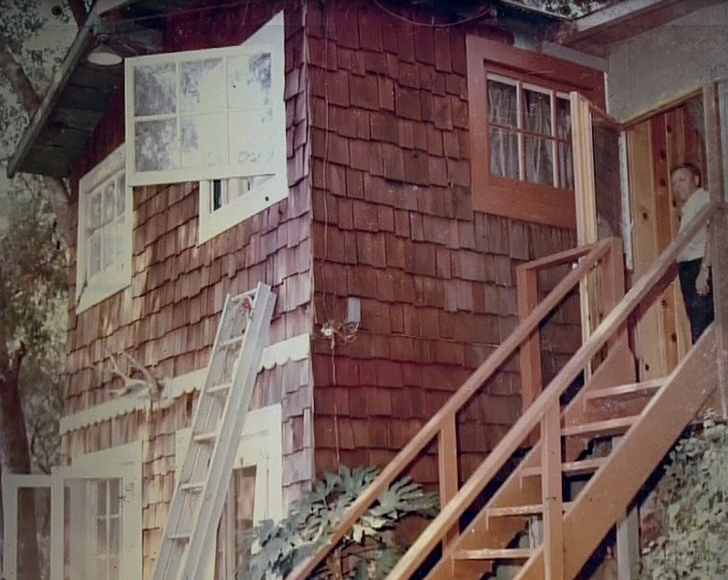
Oct. 7 – The Los Angeles County Sheriff’s Department, Homicide Bureau, Gary Hinman investigatory files. A retrospective of Hinman investigation as seen through never before released homicide, arrest, laboratory, investigation and progress reports, witness interview transcripts, and interoffice correspondences.
07/31/69 – First Homicide Report
08/04/69 – Residence Photographed
08/06/69 – Classification Change
08/06/69 – Bobby Beausoleil Arrest Report
08/07/69 – One Arrest Made
08/07/69 – Complaint Issued
08/08/69 – Palm Print Lifted
08/09/69 – Preliminary Hearing Set
10/13/69 – Additional Suspect Arrested
10/17/69 – Lynette “Squeaky” Fromme Arrested
11/00/69 – Arraignment Date Set
11/19/69 – Danny DeCarlo Statement
12/04/69 – Progress Report
12/04/69 – Stephanie Schram Statement
12/00/69 – Mary Brunner Interviewed
12/04/69 – Mary Brunner Statement
12/08/69 – Investigation Made
01/20/70 – Louis Puttek Interview
01/27/70 – Firearms Identification
01/29/70 – One Arrest
02/20/70 – Vehicle Impounded
03/09/70 – Sword Examination
03/17/70 – Gun Recovered
03/20/70 – Alan Springer Interviewed
04/06/70 – Brunner Warrant Issued
04/06/70 – Mary Brunner Statement
04/10/70 – Rosanne Walker Interviewed
04/19/70 – Grand Jury Indictments
04/21/70 – Defendant Sentenced
04/22/70 – Defts. #2 and #3 Appear for Trial Setting
04/29/70 – Defendants Arraigned
05/06/70 – Evidence Held
05/12/70 – New Sentencing Date Set
05/18/70 – Ella Jo Bailey Interviewed
05/21/70 – Mary Brunner Affidavit
06/15/70 – Defendant #1 Formally Sentenced
06/15/70 – Beausoleil Formally Sentenced
06/17/70 – Grand Jury Hearing Held
10/19/70 – Ronnie Howard Interviewed
12/19/70 – Bruce Davis Arrested
09/16/71 – Manson Family Activities
Court Releases Video of President Ford’s Testimony From Lynette “Squeaky” Fromme Trial
Tuesday, August 27th, 2013
Aug 26 – A U.S. District Judge has granted the disclosure of President Gerald Ford’s video testimony from United States of America vs. Lynette Alice Fromme, according to a report by the Sacramento Bee.
On July 24, 2013 the Eastern District Historical Society along with the Sacramento Bee filed a motion requesting the court unseal the taped deposition in order to “preserve events of historical significance in the U.S. District Court for the Eastern District of California.”
Last Wednesday, U.S. District Judge Kimberly J. Mueller granted the motion, ordering the original VHS tape be transferred to DVD and copies be provided to the Eastern District Historical Society, The Sacramento Bee, the Clerk’s office and the National Archives.
The taped deposition, which was unsealed by a prior court order in April of 1987, runs about a half hour long and shows President Ford answering questions about the events of September 5, 1975, when Fromme pointed a loaded .45 caliber handgun at him before being wrestled to ground by Secret Service agents.
Minister Moorehouse
Saturday, August 17th, 2013
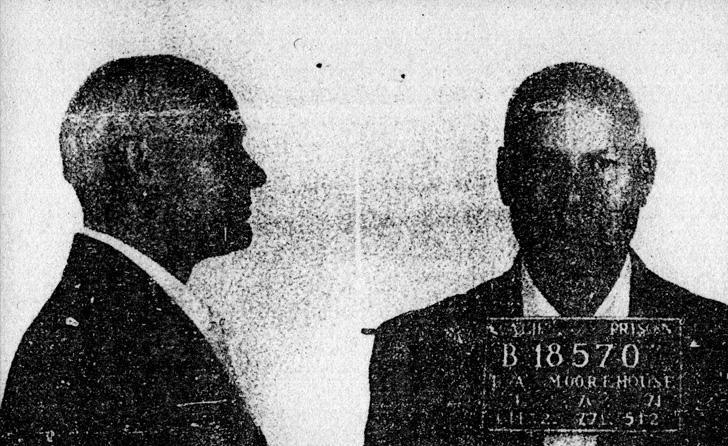
Dean Allen Moorehouse in 1971
Aug. 17 – Dean Allen Moorehouse (born 2/13/20 in Minnesota, male Caucasian, 5-5, 157 lbs., gray hair and blue eyes) grew up in the Minneapolis area and had at least two older siblings – one brother, two sisters. In 1939, at the age of 19, Dean married Audrey Lucile Sirpless and during the course of the couple’s 28-year marriage, they produced four children; Kathleen Adair (1940), Deane Thomas (1941), Sharon Lee (1945) and Ruth Ann (sometimes 1951/1952/1953)
In 1967, the then 47-year-old Moorehouse reportedly was employed, or formerly employed as a protestant minister and was residing in San Jose, California with his family. Around this time, Dean befriended Charlie Manson after picking up the ex-con hitchhiking through the area. Manson had recently been paroled from federal prison after serving almost six years of a ten year sentence for forging a $37.50 check in May of 1959.
Moorehouse invited Manson to dinner at his home and Charlie ended up staying the night. Manson and Moorehouse discussed the Bible, sang religious songs and when Charlie admired an old piano at the house, Dean told him he was welcome to have it. Moorehouse told Charlie he was always welcome in his home and Manson became a frequent visitor, taking a special interest in Dean’s youngest daughter, Ruth Ann.
Sometime that summer, Manson found a Volkswagen Microbus for sale in Moorehouse’s neighborhood and negotiated a deal with the owner to trade it for Dean’s piano. Shortly after acquiring the Microbus, Charlie took Ruth Ann on a trip up the coast which prompted her parents to report her as a runaway. The pair were eventually apprehended by Sheriff’s deputies on Friday, July 28, 1967. Ruth Ann was returned home and Charlie was arrested for trying to interfere with the police. The following month, Dean and Audrey officially ended their marriage, filing for divorce in Sonoma County.
Dean was arrested on Thursday, March 21, 1968 and charged with contributing to the delinquency of a minor, after he was found in a Redwood Valley home that Mendocino County Sheriff’s deputies raided for marijuana. Sheriff’s deputies arrested 11 individuals on a range of charges and Dean was slapped with the delinquency charge because the majority of those in the home were not of age.
Dean was arrested again in May, after Roger Tholan and Gertrude Romanski told authorities that the $50 of LSD they were found in possession of, was sold to them by Moorehouse. Dean was charged with a violation of Section 11912 of the Health & Safety Code.
A few weeks later, Ruth Ann married 23-year-old Edward L. Heuvelhorst in Santa Cruz, California in an effort to become emancipated. According to Ruth Ann, the marriage only lasted one day, and she soon headed to the Los Angeles area where Charlie and the family had relocated months earlier. Soon to follow her was an angry Dean, reportedly hell bent on getting Ruth back. When Dean arrived in Los Angeles, he met up with Charlie at Dennis Wilson’s house where Manson immediately diffused the situation by kneeling down and kissing the preacher’s toes, welcoming him to the party.
Dean spent the rest of the summer at Dennis’ house living in the guesthouse in exchange for taking care of the landscaping duties. He reportedly became a devout follower of Charlie and championed his lifestyle and philosophies. In August, Dean headed back to Mendocino in order to face trial for the LSD arrest back in May. The trial resulted in a hung jury and was set to be re-tried in December. In the meantime, Dean returned to L.A. and reconnected briefly with the family at Spahn Ranch.
Dean’s second trial began on December 17, and this time he was found guilty. He returned for sentencing on January 2, 1969, when Judge Wayne Burke sentenced Dean to 6 months at the Vacaville Medical Facility. Records show he was received the following day and that he was transferred several times during his incarceration, serving his sentence in multiple facilities, including Folsom and San Quentin.
After the Tate-LaBianca murders were connected to the Manson family, LAPD sent detectives to visit Dean in prison. According to the officers that made the trip, Moorehouse offered little to help their case.
Dean was denied parole on May 7, 1969, March 3, 1970, and August 26, 1970, before he was finally granted parole on March 23, 1971.
Little has been documented about Moorehouse’s activities in the years that followed. Records indicate he lived for a long time in the Redding, California area. In May of 1991, Dean was convicted on charges of lewd and lascivious acts on a child under 14 and given a 8-year term in state prison. He served 52 months of the 8-year term and was paroled on Saturday, September 2, 1995. He violated parole less than two years later and was returned to prison on May 29, 1997. Dean was re-released on parole on May 22, 1998 and discharged from parole supervision on Sept. 9, 1999.
Dean Allen Moorehouse passed away on Saturday, May 22, 2010 in Shasta Lake, California.
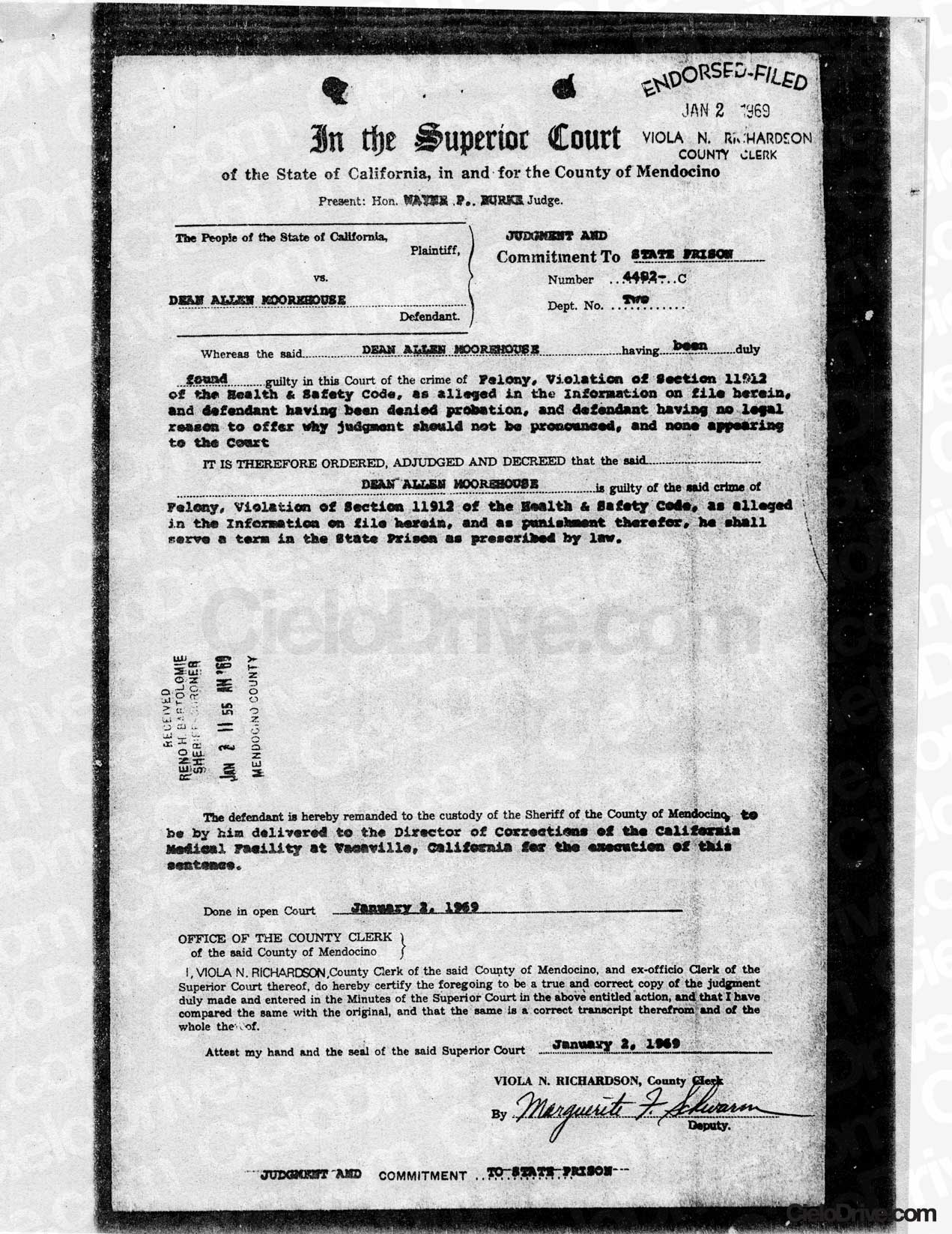
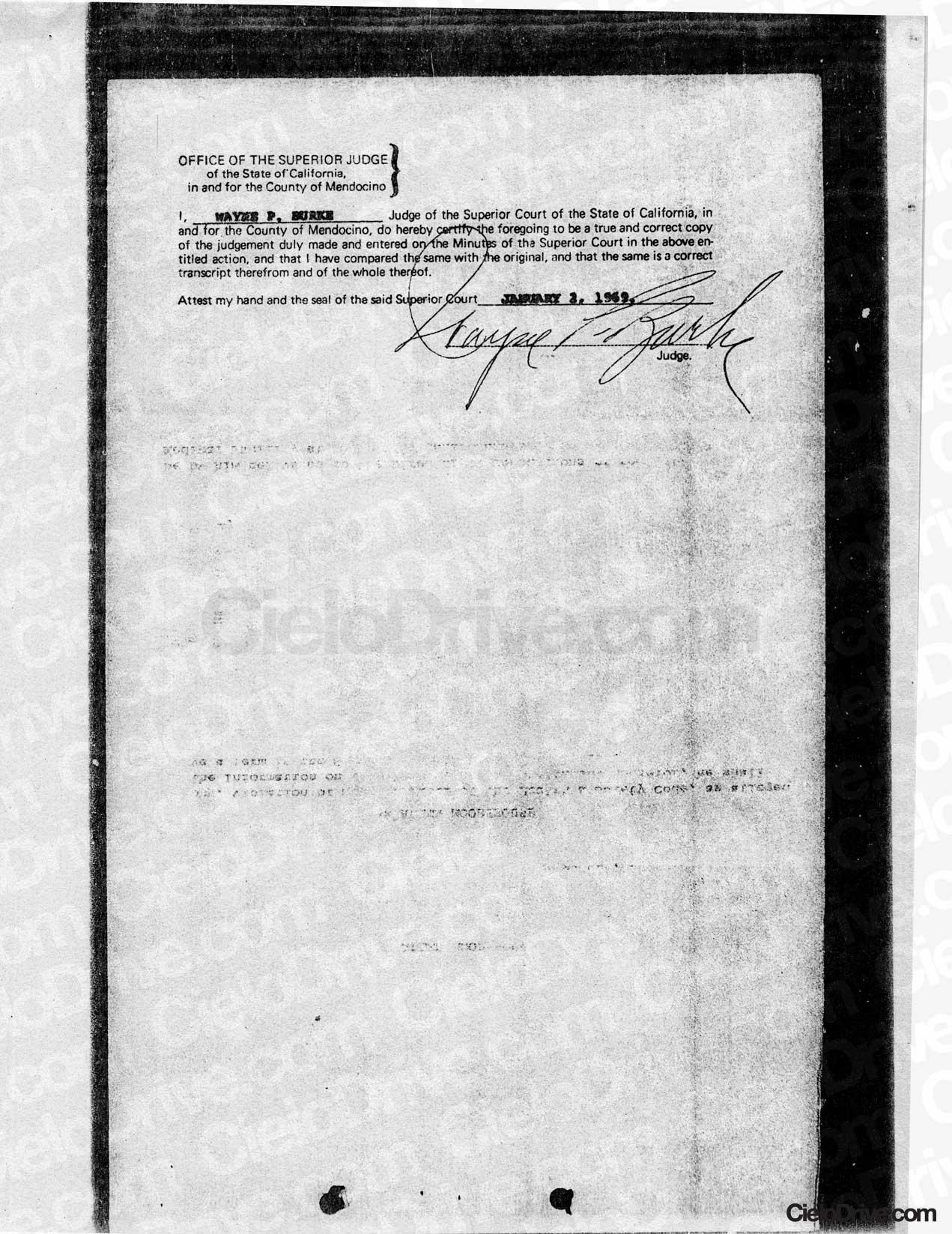
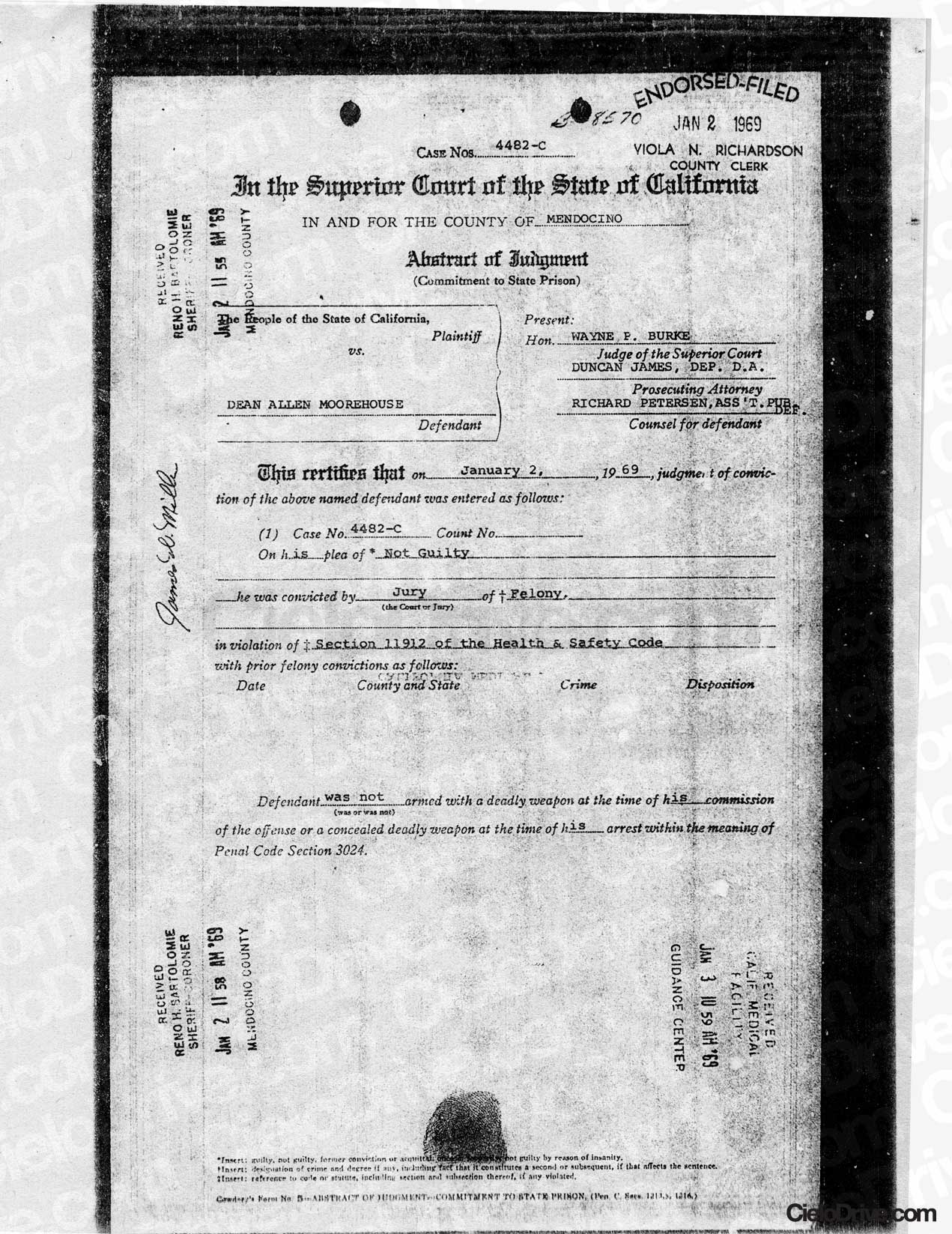
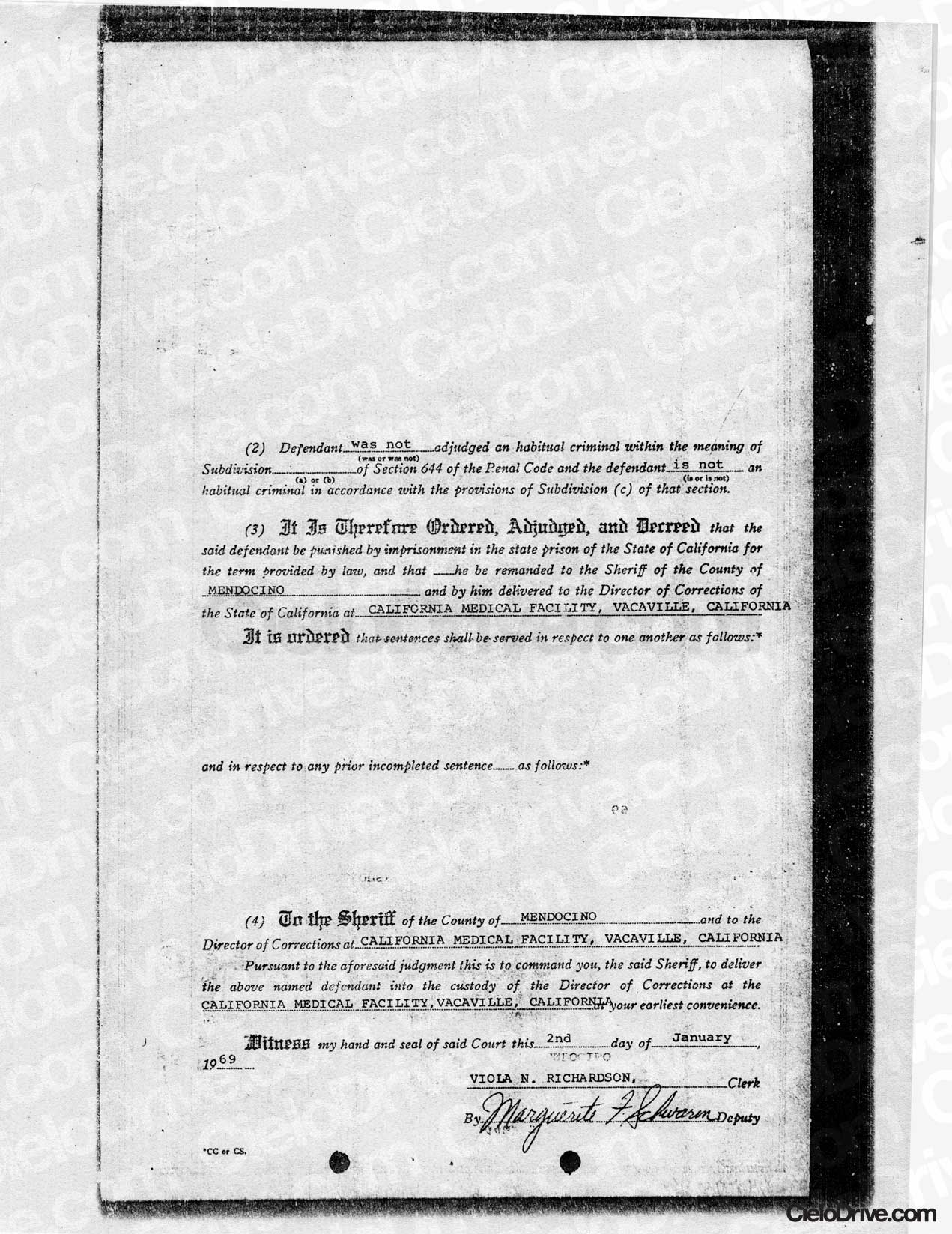
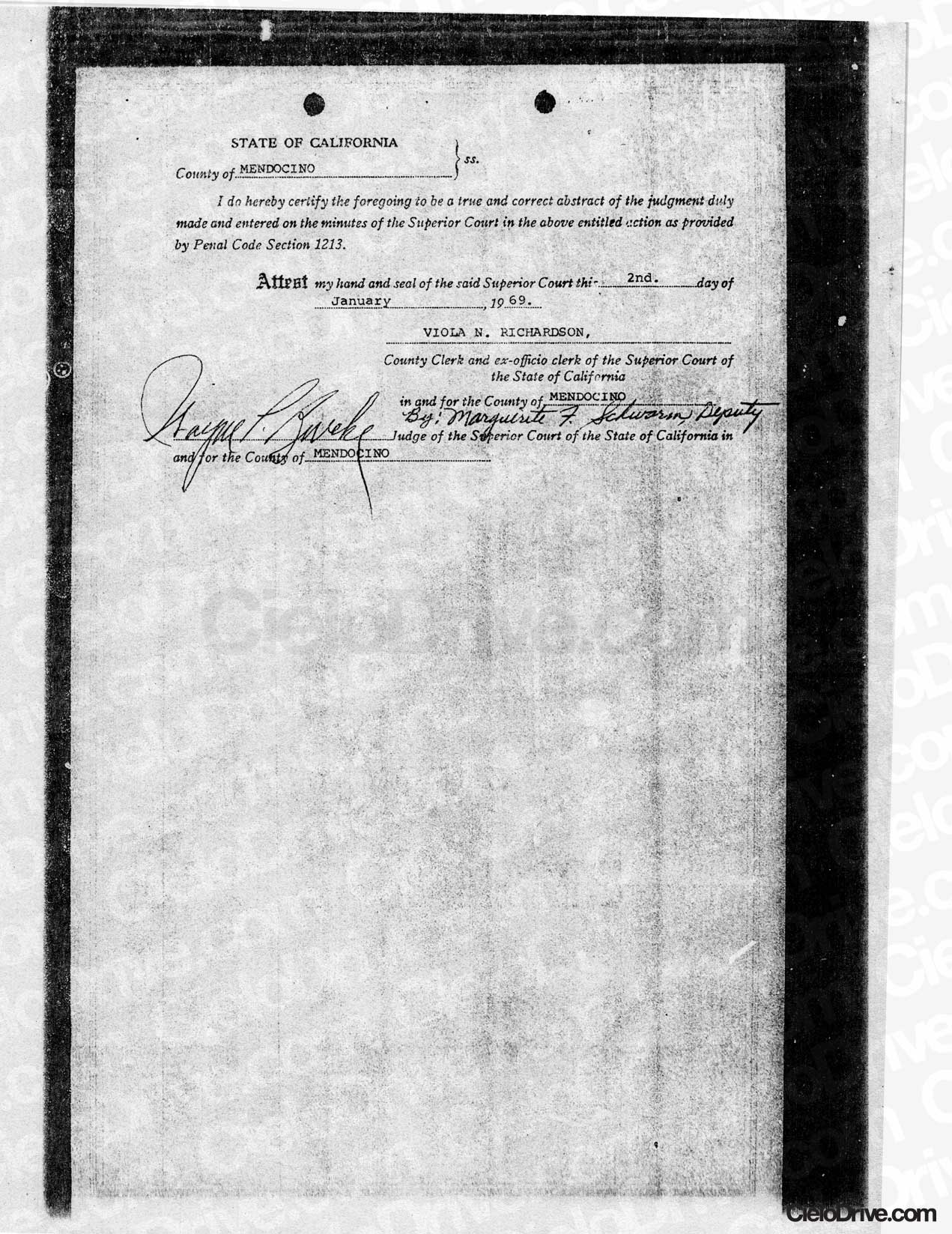
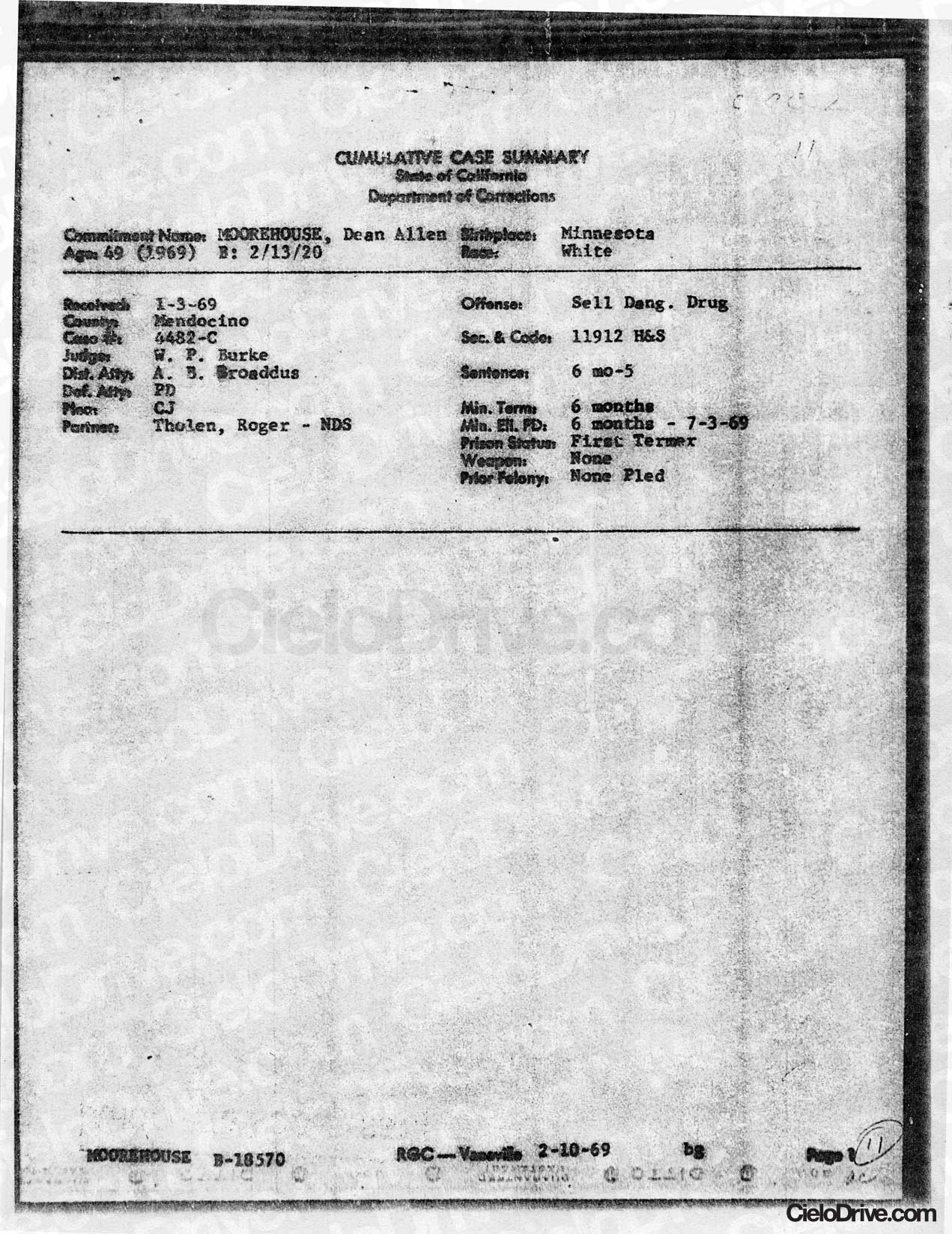
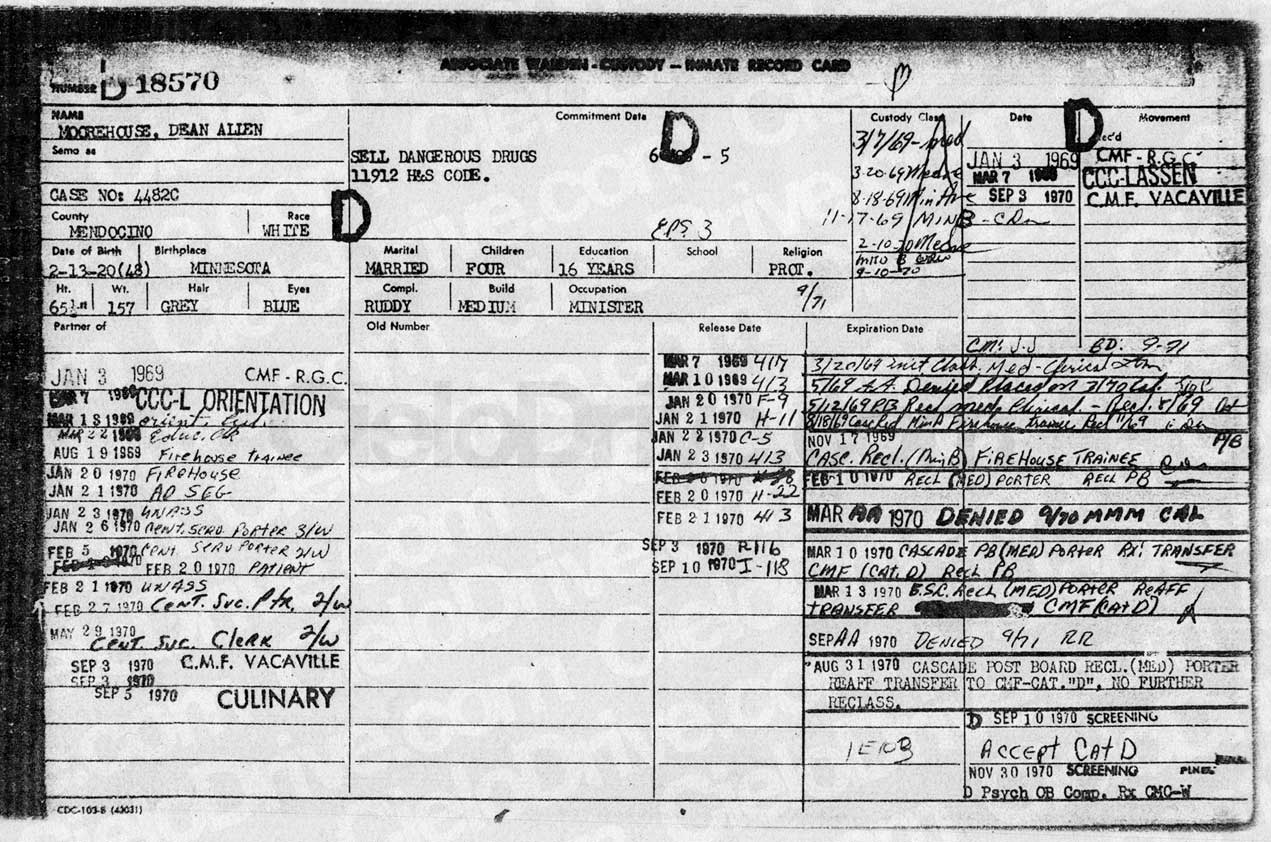
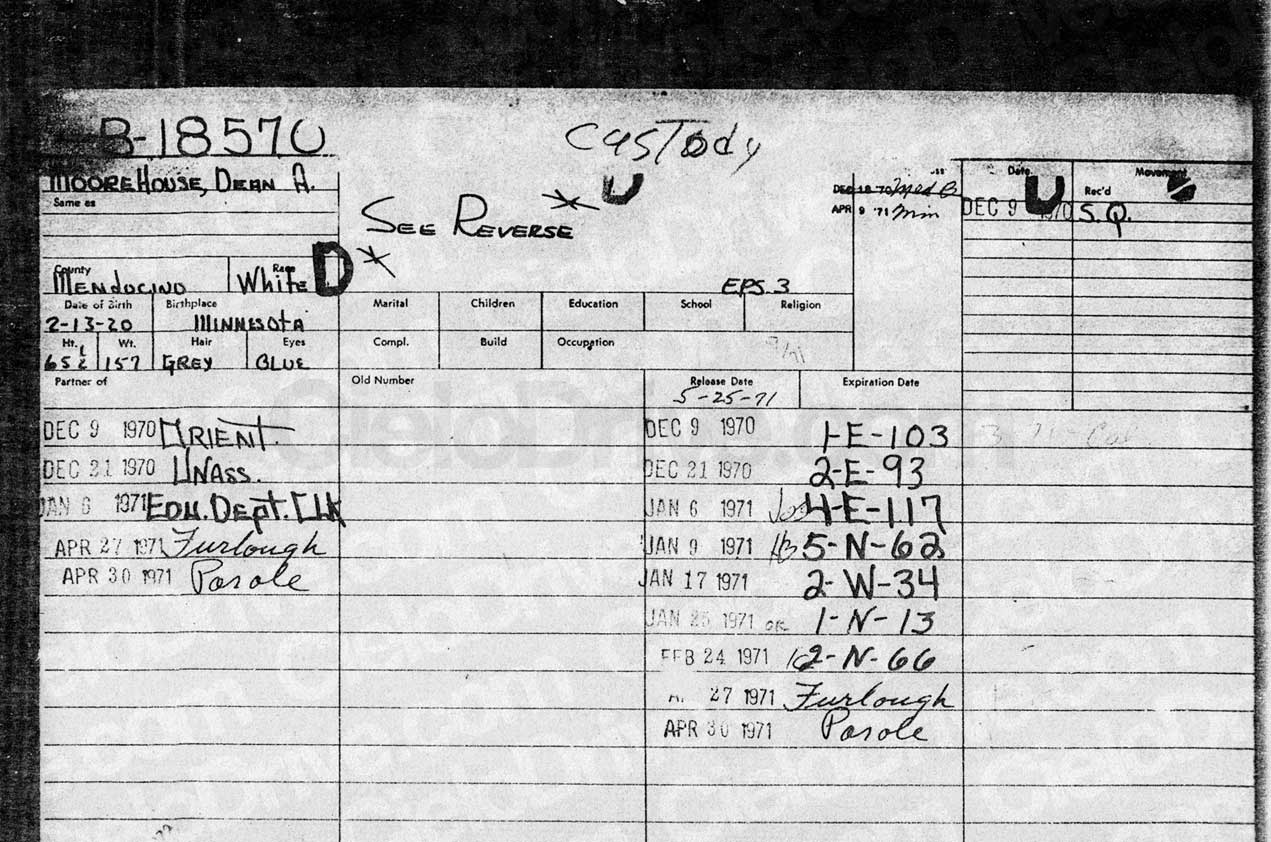
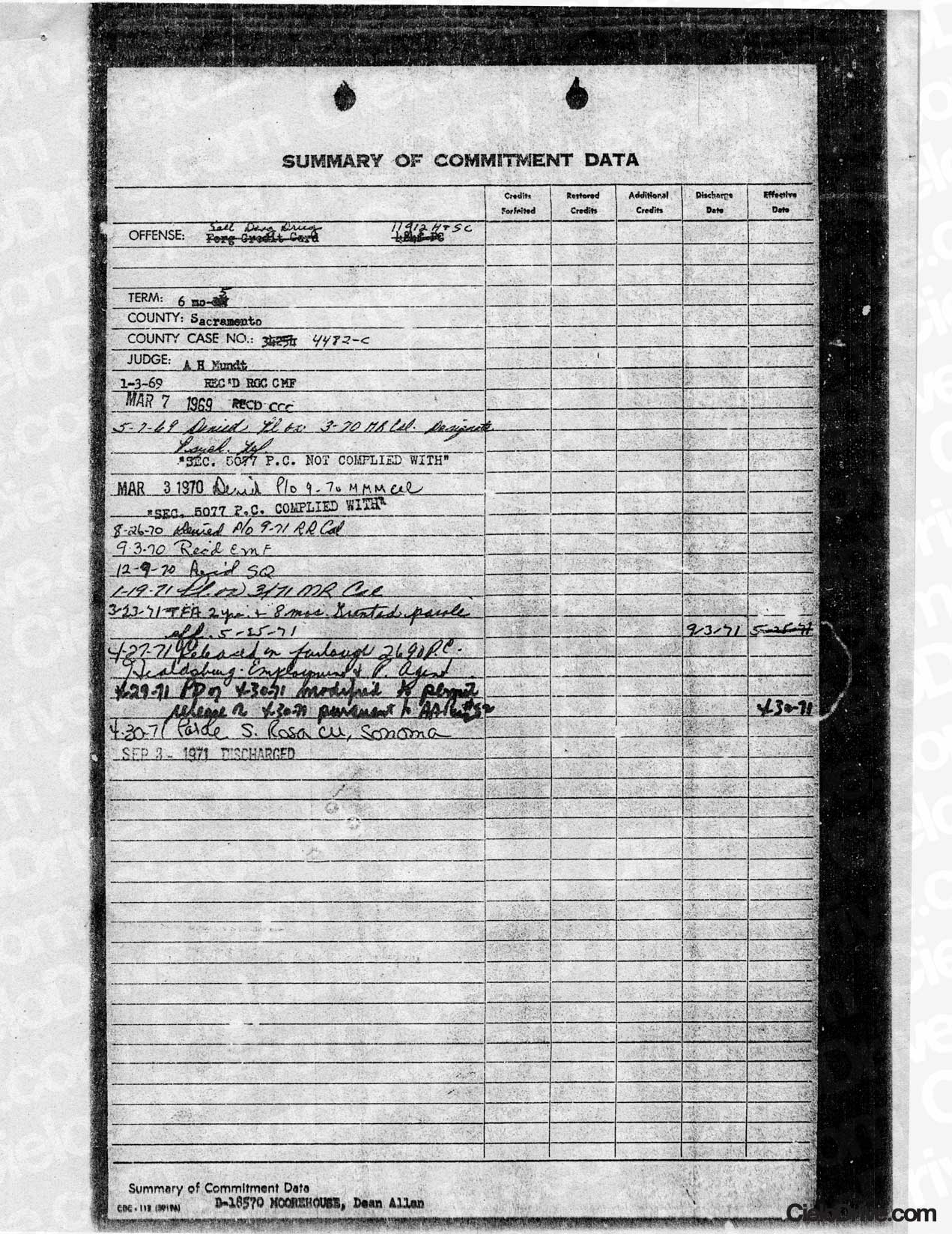
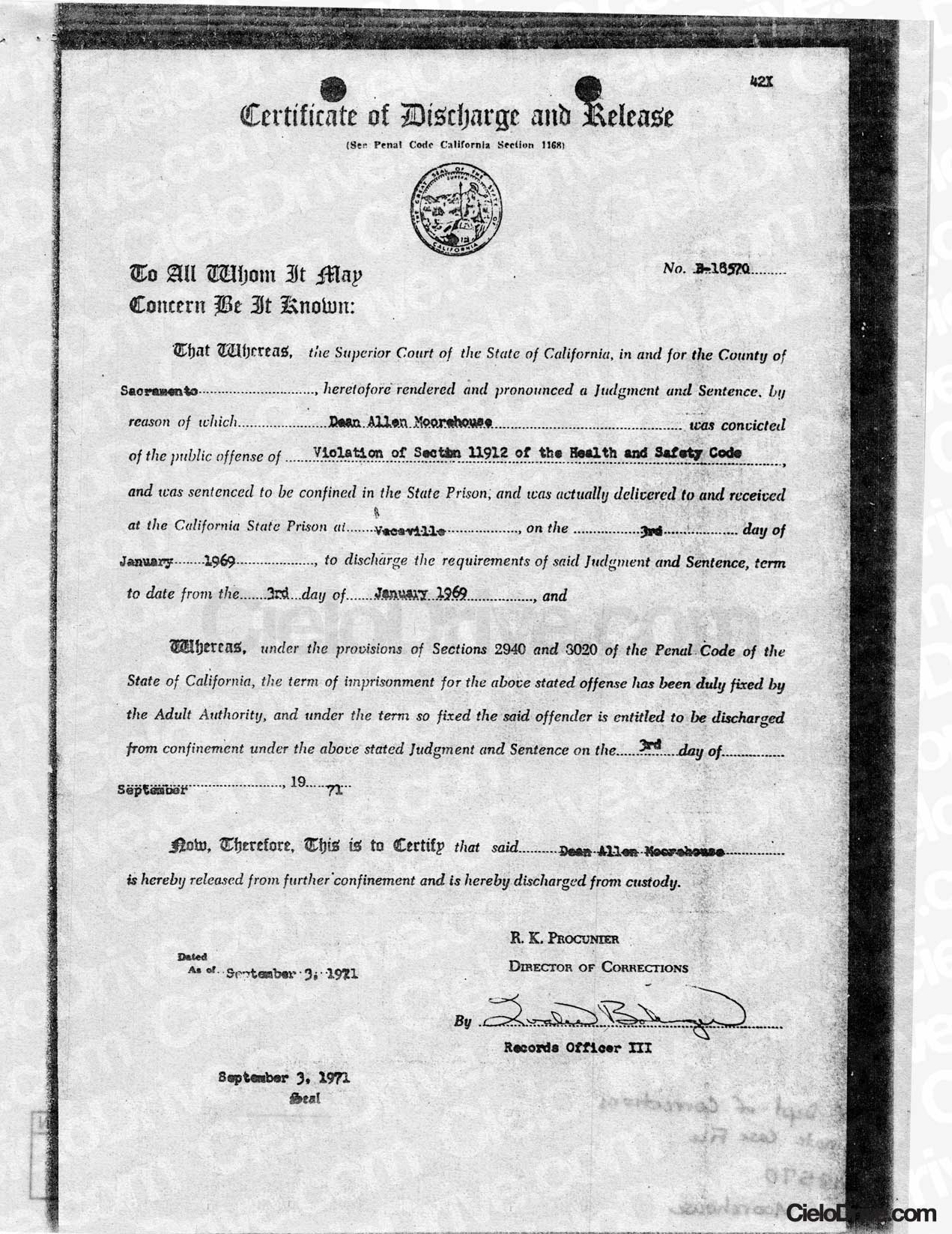
William “Billy” Doyle interviewed by LAPD Lt. Earl Deemer 8/30/69 – Part Two
Tuesday, July 2nd, 2013
Jul 2 – Part two of Lt. Earl Deemer’s August 30, 1969 interview of William “Billy” Doyle in Toronto, Canada.
SATURDAY, AUGUST 30, 1969, TORONTO, CANADA
LT. EARL DEEMER: Were you ever at a party at uh, Cielo, when a, beef occurred; when Polanski was present? (unintelligible)
WILLIAM DOYLE: Unfortunately I was.
LT. EARL DEEMER: Give me the rundown on that.
WILLIAM DOYLE: Yes, I was invited to a party at Roman’s – and Cass and I were both invited. I was invited by Wojciech. Cass had been invited by Roman. We were both – we were invited as a couple, by both of them.
Uh, Tom and John were up in – in Los Angeles at the time.
I invited neither of them.
Perhaps we should use that machine. If you could just give me an idea of the kind of questions you’re going to ask me?
LT. EARL DEEMER: I could –
WILLIAM DOYLE: I’d like you to know, that uh, Del Negro(?) invited John Deturo to that party, not me. And I made a point —
LT. EARL DEEMER: Who invited him?
WILLIAM DOYLE: Del Negro.
LT. EARL DEEMER: Uh.
WILLIAM DOYLE: And I made a specific point of criticizing Del, suggesting to Del that John won’t be there.
Uh, his brother-in-law will uh, confirm that for you. His brother-in-law had to go to the parking lot and straighten it out. John got a little juiced. And everybody at the party knew each other, of course. Uh Del invited John because I – he assumed that John and I were friends and that I would want John to be there. I didn’t know we didn’t invite John.
Uh, you know what those parties are like. I don’t serve any. I don’t need any investigation by describing a party – you already know what can – how (unintelligible) about how the parties are.
I like John. And uh, John didn’t know anyone long, and those people are very cliquish. And uh, their generosity uh, to strangers is uh, is not a, is not a watermark of these people, generally. And, for rightly so, their public is a stranger uh, and uh, they’re usually mobbed. And so uh, John maybe had a few drink, which he doesn’t do, as a rule. And he was at this party for two hours and I don’t believe anybody said anything except for me said anything to him. And he felt obviously useless there and he had no way to leave. And I could see you begin to look tough. I went into another room, talking with some people. When I came, back, somebody ran in and grabbed me and said Deturo is up in the parking lot, this one’s in trouble. Ben Carruthers and I went out to the parking lot. And John was arguing with the parking lot attendants. He uh – I believe that, they had asked him, you know, some (unintelligible). They felt his behavior was kind of strange; that they were trying to really look after him, as attendants usually do to people who are at Hollywood parties. If a star get [tape ends]
WILLIAM DOYLE: ..those people, that’s my first connection to that house. It was a very expensive home, there was a lot of very lovely landscaping up there. I didn’t notice the house in the back; the first few times I was there.
I’d loved – I’d loved to help you.
LT. EARL DEEMER: Mm Hmm.
WILLIAM DOYLE: I loved Wojciech.
I don’t think Wojciech would willing have hurt me or anyone else.
And I don’t think there’s a possibility in the world that Wojciech would’ve stood by and let anybody hurt Sharon.
He may – he might’ve let Jay handle his own case. But in the final analysis he wouldn’t let anybody do him serious harm.
LT. EARL DEEMER: What about his relationship with Gibby?
WILLIAM DOYLE: I think his relationship with Gibby – I think Mr. Folger should and will soon investigate everything and everyone. Gibby Folger was not a drug addict. Gibby Folger, I repeat, was not a drug addict. And, and – thought it was a big deal, and thought she was being incredibly mischievous to take a poke off of somebody else’s joint.
Gibby was a girl of breadth. She was a lady of equality. I was very, very, very fond of Gibby. She was uh, lovely girl.
As was Sharon – was Sharon, I think. They were really nice people – you don’t understand they were really, really fine people. It’s all a lot of nonsense and crap in the newspapers, about those girls. Neither of those girls were whores, to my knowledge. For sure Gibby wasn’t. I didn’t know Sharon all that well, but I knew Gibby. I was exposed to her a lot. She was a nice girl. She loved Wojciech and that was oblivious. She wanted him to marry her. I believe he had a wife or something in Poland. He used to talk about it when he used to drink a lot of Vodka.
Wojciech had uh, Wojciech was violently anti-Nazi. I made the mistake one time of saying in my opinion, that Asianatic Communism was more subhuman than uh, as in my opinion was uh, the worst political system in the world. And Wojciech became hysterical – apparently that had been the night that I had taken all those drugs apparently. He had gave me all those drugs and thats why he was mad a me because he was, saying that the Nazis were the worst. Apparently he had some bitter experiences with them at the hands.
And he wouldn’t marry Gibby on the account she was wealthy. I believe uh –
LT. EARL DEEMER: But he would let her keep him.
WILLIAM DOYLE: I don’t believe she was keeping him, I believe Roman was. And it may be expedited for Roman to deny it now. Uh, Wojciech has told me so.
Wojciech indicated to me that his friend Roman, uh, was helping him.
I never – never saw Wojciech doing any work. I never knew – but Wojciech told me he was having problems with his working paper.
So I assume the kind of help was material aid. You can’t live in Hollywood, in a $200,000 home, and drive a car, and have clothes, and uh, and buy drugs, and have parties, and have catering services and carry on in general, in an, in an, in an in-depth social scene, without money. It can’t be done. I couldn’t afford it.
LT. EARL DEEMER: How did you support yourself while you were there.
WILLIAM DOYLE: I had some money when I arrived there, and it was very little. And I was very prudent with it. And I spent a total of maybe, five, six hundred dollars on drugs, and that was my major expenditure.
All the time I was there – I had – I had $10,000. And in the end, the last few months I didn’t even have enough money to pay for taking the garbage away from Cass’ house. Cass was having some problems with the IRS. And I paid – footed the bills there. And if you ask Ben or Judy Carruthers, they’ll tell you so.
LT. EARL DEEMER: How about Pic, how did he support himself?
WILLIAM DOYLE: I don’t have the faintest idea. I believe when Pic came back from Europe he had some money.
Pic has always been nefarious to me – in his financial dealings.
When I first met Pic, he was strung out. I cleaned him up. I guess you know that.
LT. EARL DEEMER: Mm Hmm.
WILLIAM DOYLE: The next time I met Pic, he was strung out. I cleaned him up.
I made him cut all his hair off. One time I brought him to Canada; put him on a train. And then he went to Europe. His hair was short and he was fine. He went away and got his leg operated on, it was a big success; he came back.
Hung out with his musician fellows, got strung out again. Once again I threw him out of the house.
He was hanging around with Cass. I’m sure you know all about that too.
I love Cass. She was a nice girl, we had a lot in common. She had the same values as I did. Unfortunately, somebody convinced her that I killed those people. That I had snuck back into the country and done it. And then along with the super paranoia – concerning her girl – her, her daughter Owen, (unintelligible) because every mother’s first thought goes to her child.
She called me and told me that she had, told the police a whole bunch of things concern – about me; she apologized.
She told me that, she didn’t believe that I had did it. And that, at the time, that Mr. John Phillips had told her that, the police were coming there to arrest her; for withholding – withholding information and that she’d be an accessory to murder, or something.
You ask her. Call her when you get back, she’ll tell you that that’s what she told me.
I believe – was it you that Cass spoke with?
LT. EARL DEEMER: No, I didn’t talk to her.
WILLIAM DOYLE: But you’re familiar with the detectives that when out to talk to her.
LT. EARL DEEMER: Yeah, I’ve uh, frankly never talked to Cass at all.
WILLIAM DOYLE: The uh, everybody in California seems to a degree in spy-manship. Everybody that uh – a lot of those people – a lot, a lot – that was one (unintelligible). Within super – within the confines of the social scene, that, that, that I was socializing in (unintelligible) out of the country.
Wojciech uh – Wojciech led a truly social life. He had no – the fact that Wojciech that’s even a drug dealer is as alien as the thought of me homesteading on the moon; he – first of all he had great difficulty speaking English. He so far out of touch, with that kind of thing. That he couldn’t have sold any drugs and he wouldn’t – I don’t believe he really knew where to go to buy any. In fact it’s a mystery to me who was his connection. And I can tell you right now, it wasn’t me.
Because we wouldn’t have any smoke at Cass’ house; because Owen was there. Cass has been just divorced, and shh – no trouble.
And you could, they – anybody at anything could walk over there to 7708 Woodrow Wilson Drive and tear it top to bottom. There’s never any drugs there. I know this uh – I guess you’ve heard. I’ve uh – Cass used to – when Pic was around, there were drugs around. I put a stop to that. That’s the truth. I really did.
LT. EARL DEEMER: When did you say was the last time you saw Pic?
WILLIAM DOYLE: Last time I saw Pic was seven months ago.
Pic and Wojciech were close.
Uh, Pic and I were close. But finally I couldn’t like Pic anymore.
Wojciech tried to help. Wojciech was not a bad fellow. Everybody that represents Wojciech as being a bad fellow, has something to gain, or something to hide, is doing that.
Wojciech was really motivated by the highest things. Wojciech wasn’t strung out, when I saw him last, or anytime through the time that I saw him; he really wasn’t.
Pic was, in bad shape. Wojciech took him in, gave him a home, and cleaned him up. It’s most difficult to put up with people when they’re kicking.
It’s hard for a fellow to put up with his girl.
LT. EARL DEEMER: Yeah, did you and Pic have any uh, beef with John Phillips over Michelle?
WILLIAM DOYLE: Michelle was a cobra. I’ve never had anything to do with Michelle. I’ve never kissed Michelle. I’ve never held her hand, nor would I.
Michelle Phillips is a (unintelligible) lady. I have no interest in the Phillips.
I know John Phillips to be a bragger. I know John Phillips to be the father figure to the Mamas and the Papas. And I know when Cass had her troubles last (unintelligible) I heard John Phillips tell some people that Cass was strung up on drugs which is patently false.
Dave Victorson, at Caesars Palace wouldn’t have an entertainer in there that was strung out on drugs. Do you understand?
I mean, he really wouldn’t.
LT. EARL DEEMER: Mm Hmm.
WILLIAM DOYLE: Cass’ struggles leaving – John Phillips came in and uh, then said, “See. I told you couldn’t make it on your own, etc., etc.”
I told him to uh, to shut up. Michelle said something, I told her to shut up. He jumped up and gave me a push.
(unintelligible) was in the room at the time – who was Cass’ musical arranger – assisted John out the door. That’s exactly what happen that time.
I’ve been to, John Phillips’ house on more than ten occasions, always with Cass. I’ve never had any dealings with John Phillips concerning his wife. I, I couldn’t be less interested. I know that John Phillips used to settle all his arguments with Cass by hitting her. When I came around, that ended.
I told John Phillips if he had anybody to hit, he could hit me.
I’m not bitter about John Phillips. I do however know about – what I’ve been told, from people in California, that John Phillips has, has laid the blame squarely at my feet. And I would (unintelligible) enter in reality. For what I’ve read in the paper. I believe, that if you go to John Phillips, with this machine and ask him to repeat all the testimony that he’s given to you – and to, and to uh, and to Polanski – that you’ll end up arresting him for mischief.
Or have the grounds to at least.
‘Cause John, John would believe – have you been to John’s house?
LT. EARL DEEMER: No.
WILLIAM DOYLE: He lives in a very expensive house; which he earned.
I believe that basically he’s a fine guy.
LT. EARL DEEMER: What’s he doing? Arranging or what?
WILLIAM DOYLE: I don’t know what he’s doing. I know that his overhead is enormous and the residuals from the Mamas and the Papas are off very badly. And I know he’s been, heading – I know his financial situation is not quite what he’d like it to be.
I believe he did all that with (unintelligible) with a uh, Monterey Pop Festival thing; that’s hearsay.
All I know that he’s desperate to make any kind of fame. Brian Jones of the Rolling Stones was found dead. John and Michelle wanted to have a big wake at their house. Anybody that knew Brian, was aghast. And they were called up by a number of people and told not to do that, that it won’t look well.
No one (unintelligible) I mean no one of the people uh,
John would use anything, and has, and will use anything to, to aggrandize himself, or to secure for himself a position in the Hollywood community, because he is attempting – and it’s a difficult thing to make the transition from a rock and roller, to a regular of the – to a regular of the Hollywood establishment. That’s a difficult task for a man to do, it’s highly competitive. And I believe he’s, uh – I believe his uh, his effort was uh, was uh, not in the interest of, of, of assisting Police with the crime. But more of in the interest of endearing himself to the, to the bereaved.
LT. EARL DEEMER: If we could stop for uh, cup of coffee, I want to call uh, McGann, and uh, see if there’s anything else that uh, wants to be uh –
